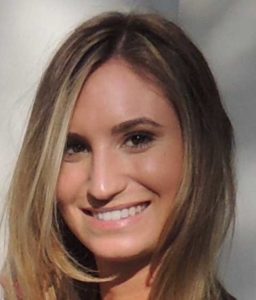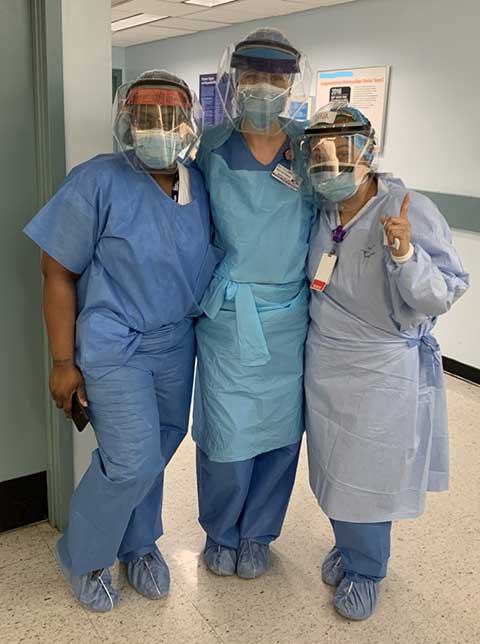The first two nurses profiled in FGCU360.com’s series – a tribute to Florida Gulf Coast University School of Nursing faculty and graduates who have faced the virus’ deadly effects working tirelessly in emergency units – were based in Southwest Florida hospitals. But Marre, a Boca Raton resident who earned her FGCU nursing degree in 2013 after transferring from Florida State, then went on to earn a master’s from Maryville University in St. Louis to become a family nurse practitioner, has been working for NYC Health + Hospitals system in New York City – epicenter for the coronavirus outbreak in the U.S.
In other words, Marre has been treating some of the almost 55,000-and-counting hospitalized COVID-19 patients among more than 210,000 reported cases and, tragically, more than 24,000 deaths attributed to the virus so far in New York City.
She was originally hired as a nurse practitioner to work with an emergency relief team, but the system was desperate for critical-care nurses – one of her specialties — so Marre went into COVID-19 ICUs at two hospitals. She also got a taste of COVID-19 herself, as she relates.
Fortunately, the situation has improved dramatically this month as The Big Apple slowly reopens, but Marre was in the pits to witness the pandemic at its peak, and reflects upon that experience with FGCU360. At the end, she also shares a heartfelt letter of self-reflection she wrote that hints at the impact that experience has had on her.
FGCU360: For you personally, what have been the toughest things to deal with on the job?

MARYLEE MARRE: Not having enough time to cope with the emotional trauma of it all. You have to constantly push that heartbreak aside for the moment to do the job at hand. That was what I did for each shift I worked, night in and night out. And at that time, that’s all I could do.
I worked four cardiac arrests in a matter of 2 ½ hours, running out of lifesaving supplies because there was not enough time to restock the crash carts between codes. I witnessed death after death. I saw patients alone, and dying alone. I did my best to make them feel loved and cared for and not alone, but I don’t know if that was enough.
We were doing everything we possibly could to keep these patients alive. All you can do is keep doing what you’re doing and pray to God that it is enough … even though you know it won’t be. That internal battle, that conversation that you have day in and day out, is the hardest conversation I have had to have with myself.
It was truly a war zone. I have never seen anything like it.
And not having enough personal protective equipment (PPE) and wearing the same N95 mask for a week, hoping to God it was still intact. I later became COVID positive ‑- and symptomatic — which was a whole other battle.
FGCU360: Conversely, what positive developments have you seen?
MARYLEE MARRE: Everyone coming together in unity and working cohesively as a team. Nurses stepping up to the plate to take care of critical patients when they did not have the critical-care background, but knew we were so desperately in need of more nurses that they were willing to learn and jump in to help us.
FGCU360: In your opinion, what will be the “action items” that have to be addressed after this crisis has passed?

MARYLEE MARRE: Enough PPE for healthcare workers. There needs to be anticipation of something like this occurring again, and there should always be enough stocked or easily accessible, made in the U.S. I also believe that the government should be in charge of distributing it to healthcare providers, and not the individual hospital’s responsibility.
Also, we need hospitals sharing treatment plans with each other, ranging from local to those in other parts of the world.
FGCU360: No one in healthcare at every level – from medical-supply companies to healthcare workers — could have been totally prepared for a pandemic such as this. But in that light, how did your education and experiences at FGCU help you deal with such a crisis?
MARYLEE MARRE: I always say thank God I went to FGCU for my BSN. FGCU stressed the components of what makes up a successful nurse: academia including how to critically think, hands-on skills, compassion, and experience that would later be gained through work experience. In this time of crisis, the balance of these things helped me to provide the best care possible.
FGCU360 then asked Marre if there were any other reflections she’d like to contribute, and she offered the following letter that she wrote. It’s a raw outpouring of emotion from a healthcare professional thrust into a situation of despair no one saw coming.
Inside the Mind of a Frontline Nurse/Nurse Practitioner
A letter by Marylee Marre
I knew that if I wanted to get back to the front lines, I needed to address what I so badly had buried.
When you’re working on the front lines, you still feel. But it can’t take you away from the job at hand, so you feel your “feels,” and you quickly move on. And by that, I mean that the patient who was 36 years old that you fought so hard to keep alive, when he passes away, you feel the tears roll down your face uncontrollably. You can’t get to your face to wipe them away because you have your double mask, eye shield and face shield on, so you just let the tears roll down your face in the middle of the ICU, right outside his room.
It doesn’t even take 30 seconds before being pulled in another direction, and you know you must keep moving. So, you push that heartbreak aside for the moment. That was what I did for each shift I worked, night in and night out. And at that time, that’s all I could do.
But I didn’t realize the major effect it would have on me later, when the hustle stopped, and I was all alone. I quickly felt numb. I felt like those emotions that I felt before were gone. I so badly wanted to feel again. As I sit here thinking that I need to get back to work, now that I feel much better after my personal battle with COVID-19, I also realize something else:
I need to revisit the past few weeks and break this glass wall that I put up.
I wasn’t even three hours into my first shift in the makeshift COVID ICU unit when I shed my first tear. I was checking on a male patient in his 50s, thinking to myself that this is someone’s dad, someone’s husband. I immediately thought of my father … and that’s when the tears started streaming down my face.
See, nursing is a beautiful thing, but it is also a curse because your heart aches in certain moments, and it is a lot to handle and balance. Every patient seemed to have the same story — similar presentations, similar treatment patterns with little improvements and a downward trajectory that couldn’t be stopped. Even though you worked your ass off, these patients were dying.
As I sit here writing this, I picture the makeshift ICU perfectly, which is interesting because if you know me, I have the worst memory when it comes to certain things. But this I can remember vividly.
I remember my sweet man in the first room who reminded me of my father. I remember my cute, little old grandma in the second room. I could see the fear and deep sadness in her eyes, and it broke my heart. All I could do is tell her we were doing everything we could for her. I asked her to keep staying strong and calm, as she was already doing an amazing job of that. She was so calm despite being intubated and on no sedation. I don’t know if she was tired of fighting, giving up, or if she knew this was the only way she could be in order to give herself a fighting chance. I remember talking to her, and I hoped that made her feel loved and cared for. Because again, I knew she was someone’s grandmother, someone’s mother.
What you need to understand is that these patients aren’t just our patients. We view them as our loved ones. They make us think of someone we hold dear to our heart.
In the next room was my 40-something patient who was the sickest of them all. He had multiple central lines, an arterial line so we could most accurately and closely monitor his blood pressure, and a dialysis catheter so he could receive CRRT (continuous renal replacement therapy) because he was too unstable for normal dialysis. He especially broke my heart. I would just stare at his drips. He was maxed out on multiple pressors, and his blood pressure barely reflected that; it was at the minimum limit. And that is just the short version of his very complicated story. What else could we do? We were doing everything we possibly could to keep this young man alive.
All you can do is keep doing what you’re doing and pray to God that it is enough, even though you know it won’t be. That internal battle, that conversation that you have day in and day out, is the hardest conversation I have had to have with myself.
I realize that this is just touching the surface — a three-hour glimpse into the hundreds of hours I worked — but it is a start. So, my fellow frontline warriors out there, please take care of yourself. Give yourself the time and safe emotional space you need to process all that we have seen.[/vc_column_text][vc_column_text]
ABOUT THIS SERIES
FGCU360 would like to hear from any alum or faculty/staff member actively involved in the COVID-19 fight who wishes to share her or his personal story. Contact Keith Gibson, FGCU Marketing and Communications, at [email protected].
Previously:
- Sherri Parmar, nursing graduate working at Gulf Coast Medical Center in Fort Myers
- Kelly Goebel, assistant professor working at Naples Community Hospital
MESSAGES FROM MARIEB
“The economic and health impact our graduates have on not only our local communities but communities all over the United States is impressive. Marieb College and the School of Nursing is a major contributor to the health and welfare of our citizens. As we are now experiencing, health is tied directly to productivity in our economy and to social wellbeing. We are honored to produce nursing and health workforce graduates who are able to protect the health of the public.”
— Ann H. Cary, PhD, MPH, RN, FANP, FAAN
Dean and Professor, Marieb College of Health & Human Services
Chair, Board of Directors, American Association of Colleges of Nursing (2018-20)
Robert Wood Johnson Executive Nurse Fellow
“We are especially proud of our FGCU nursing alumni who are working on the frontlines of the COVID-19 response. We know they have outstanding skills and are emerging as leaders in nursing. We admire the resilience, initiative, dedication and fearlessness that set them apart in practice. On behalf of the FGCU School of Nursing faculty, staff and students, I would like to say thank you for your spirit and exceptional nursing care.”
— Anne Nolan, PhD, RN, FACN
Conner Professor in Nursing
Director, School of Nursing
Marieb College of Health & Human Services[/vc_column_text]